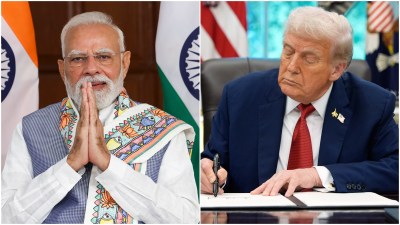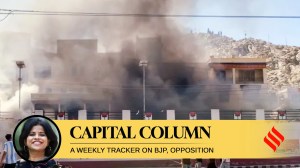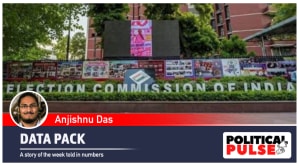Red ripples in shallow waters
The re-emergence of the Left, after many years of political eclipse, in the aftermath of the 2004 elections, injected some colour into India...

The re-emergence of the Left, after many years of political eclipse, in the aftermath of the 2004 elections, injected some colour into Indian politics. At least the monotony of the constructed dualities — fundamentalist versus secular — was partially relieved by the possibility of a new debate between market and state, growth and redistribution. These debates had been fermenting issues in civil society, among activists, NGOs, academics. But in the political realm, there was no debate on liberalisation, really, during the NDA years.
With the tumultuous political changes wrought by the elections, the scale of liberalisation once more became a debatable question. The actors in this drama, however, and the context in which they act out their roles, set the tone of the debate. Suddenly, a Chidambaram, known earlier for his faultless commitment to marketisation, appears in the garb of a restraining spirit, an elder statesman overnight bestowed with the supreme knowledge of how to inform the market with social justice. In fact, the entire Congress team, the PM included, the original architects of reform, were by an ironical twist of fate, put into roles where they must act as “less liberalisers” than the liberalisers of the earlier regime.
But the business of government must proceed by specific acts, not only by image comparisons. How, then, to maintain the public face of the benevolent liberaliser, and proceed with “reforms” at the same time? A partial answer was obviously sought by putting in place the backroom boys who would do the job without attracting too much attention. Thus the induction of Montek Singh Ahluwalia, a technocrat par excellence. Ahluwalia’s recent arguments with the Left high command over the induction of a few World Bank and McKinsey experts into the Planning Commission, has generated some interesting features about the quality of political debate in India.
In the first place, there is the issue itself. The admission of World Bank/ADB/McKinsey experts into the Planning Commission would compromise our autonomy, the Left feels. But, one may be excused for pointing out, isn’t the World Bank everywhere? In huge loans to state governments, in innumerable development projects ranging from watershed to panchayats, with their experts, their workshops, their consultants, their research projects. It would indeed be difficult to convince anyone that by arguing for the exclusion of the World Bank experts from the Planning Commission, the Left is arguing for the exclusion of the World Bank’s presence and ideology in any broad sense. What’s in a few more experts, one might surely say.
Then, Abani Ray’s (RSP) petulant statement that those who lend money to us, should remain satisfied with timely repayments and not try to influence policy. It would be painful as well as unnecessary to remind him that loans come with policy recommendations and advice. Therefore, there would be few takers for his suggestion that we are justified in taking loans but not the Bank’s advice.
Then again, in 2002, the Left Front in West Bengal commissioned the international management consultancy company, McKinsey, to review its economic policies. In government statements and media presentations of that time, the McKinsey Report indeed appeared to be a watershed in the Left Front’s life. Ministers in high profile departments like IT became highly stimulated by the report’s recommendations that the state should become investor friendly in sectors like IT and ITES. Agencies within government declared themselves to be upbeat about BPO. The relationship between McKinsey and the government, according to the company’s representatives, was set on firm footing and was set to move further.
The line, if there is one, is indeed thin between inviting World Bank and McKinsey experts to aid the Planning Commission, and inviting McKinsey to aid the West Bengal government by reviewing its performance and potentials. We should, in principle, resist the induction of foreign experts into our planning bodies. But the Left’s own inconsistent position on this makes its criticism flawed and weak.
Thus the debate, which appears to be about ideology, is in fact about nothing substantive, and quickly collapses into an argument about the role of outside experts. The government responds patronisingly, saying that the Left’s sensibilities cannot be ignored. Ahluwalia, while reiterating the importance of experts, mentions that they are only being brought into “groups” not “committees”. Having sunk to this level of trivia, the debate will soon disappear from public vision.
The Left’s dilemma on questions like these is perhaps at two levels. First, the shallowness of the Left’s challenge to liberalisation is part of the deeper ideological and intellectual malaise that besets Leftist politics the world over. In the post communist era, the Left has yet to come up with an anchoring of the widespread discontent over increasing economic inequalities.
But at another level, in the realm of practical politics, social democratic and leftist parties, in as varied contexts as western Europe and China, are attempting to evolve institutions which can use the market for growth and at the same time provide a balance in terms of equity and social security. At this second level, then, the debate is less about paradigms of growth, and more about the changing nature of struggles and new institutions that can address the question of welfare within the framework of globalisation. But in India, the Left’s contribution to this debate has not been remarkable, measured by its lackluster performance in the state where it has ruled for almost three decades, both in terms of growth and equity. Given the vacuum at these two levels, the Left is left with token issues like the role of experts. Indeed, we certainly require institutions that would create the necessary limiting framework for marketisation. But with an ambivalent ideology and highly flawed governance record, the Left is perhaps not in a position to pitch that challenge effectively.
The writer is associate professor, Institute of Social and Economic Change, Bangalore





- 01
- 02
- 03
- 04
- 05

























